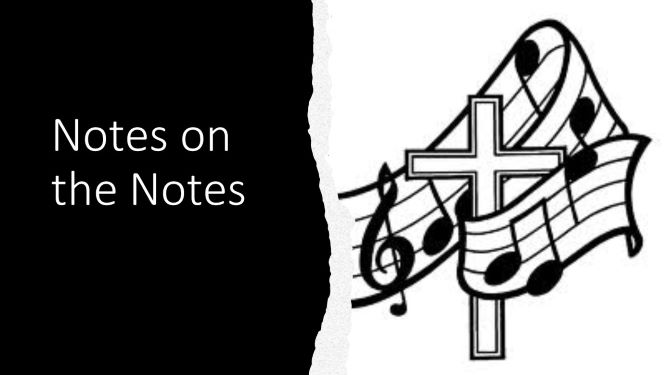Notes on the Notes – October 27, 2024

This week’s music:
“I am the Light of the World” (VU #87)
I am the light of the world! You people come and follow me!”
If you follow and love you’ll learn the mystery of what you were meant to do and be.
When the song of the angels is stilled, when the star in the sky is gone,
when the kings and the shepherds have found their way home, the work of Christmas is begun…
To find the lost and lonely one, to heal the broken soul with love,
to feed the hungry children with warmth and good food, to feel the earth below, the sky above!…
To free the prisoner from all chains, to make the powerful care,
to rebuild the nations with strength of good will, to see God’s children everywhere!…
To bring hope to every task you do, to dance at a baby’s new birth,
to make music in an old person’s heart, and sing to the colours of the earth!…”
Jim Strathdee is an American composer and performer of religious music. The text of this song is based on a Christmas poem by Howard Thurman, a prolific 20th-century writer, theologian, and teacher. The song grew out of Strathdee’s music ministry at an intercultural, bilingual congregation in Los Angeles. It was written in 1967.
“Amazing Grace” (VU #266)
“Amazing grace! how sweet the sound that saved a wretch like me!
I once was lost, but now am found, was blind, but now I see.
‘Twas grace that taught my heart to fear, and grace my fears relieved;
how precious did that grace appear the hour I first believed!
Through many dangers, toils, and snares, I have already come;
‘Tis grace that brought me safe thus far, and grace will lead me home.
The Lord has promised good to me, his word my hope secures;
He will my shield and portion be as long as life endures.
When we’ve been there ten thousand years, bright shining as the sun,
We’ve no less days to sing God’s praise than when we’d first begun.”
“Amazing Grace” was written by the English poet and clergyman John Newton (1725-1807), published in 1779. Containing a message that forgiveness and redemption are possible regardless of sins committed and that the soul can be delivered from despair through the mercy of God, “Amazing Grace” is one of the most recognizable songs in the English-speaking world.
Newton wrote the words from personal experience. He grew up without any particular religious conviction, but his life’s path was formed by a variety of twists and coincidences that were often put into motion by his recalcitrant insubordination. He was pressed (forced into service involuntarily) into the Royal Navy, and after leaving the service became involved in the Atlantic slave trade. In 1748, a violent storm battered his vessel so severely that he called out to God for mercy, a moment that marked his spiritual conversion. However, he continued his slave trading career until 1754 or 1755, when he ended his seafaring altogether and began studying Christian theology.
Ordained in the Church of England in 1764, Newton began to write hymns with poet William Cowper. “Amazing Grace” was written to illustrate a sermon on New Year’s Day of 1773. It is unknown if there was any music accompanying the verses; it may have simply been chanted by the congregation. It debuted in print in 1779 in Newton and Cowper’s Olney Hymns, but settled into relative obscurity in England. In the United States however, “Amazing Grace” was used extensively during the Second Great Awakening in the early 19th century. It has been associated with more than 20 melodies, but in 1835 it was joined to a tune named “New Britain” to which it is most frequently sung today. “Amazing Grace” is “without a doubt the most famous of all the folk hymns,” and it is estimated that it is sung 10 million times a year.
See 7-yr old Rhema Marvanne sing the hymn at: https://youtu.be/DDDlxmsciqY
See Il Divo in concert at: https://youtu.be/GYMLMj-SibU
“Open My Eyes” (VU #371)
“Open my eyes, that I may see glimpses of truth thou hast for me;
place in my hand the wonderful key that shall unclasp and set me free.
Silently now I wait for thee, ready, my God, thy will to see.
Open my eyes, illumine me, Spirit Divine!
Open my ears, that I may hear voices of truth thou sendest clear;
and while the wave-notes fall on my ear, everything false will disappear.
Silently now I wait for thee, ready, my God, thy will to see.
Open my ears, illumine me, Spirit Divine!
Open my mouth, and let me bear gladly the warm truth everywhere;
open my heart and let me prepare love with thy children thus to share.
Silently now I wait for thee, ready, my God, thy will to see.
Open my heart, illumine me, Spirit divine!“
Clara H. Scott (1841-1897) provides us with a hymn of consecration that has been sung for over 100 years. The text of “Open My Eyes” was written in 1895 shortly before Scott’s death. Each stanza reveals an increasing receptiveness to the “Spirit divine.” Open eyes lead to “glimpses of truth.” Open ears lead to “voices of truth.” An open mouth leads to sharing the “warm truth everywhere.” An open heart leads to sharing “love to thy children.” Today, we open ourselves to hearing God’s word and letting it change and challenge us.
Sing along with the choir at First United Methodist Church in Valdosta, Georgia at: https://youtu.be/71jExPuxRBY
Hear The Praise Singers:
“Praise God from Whom All Blessings Flow” (VU #541)
“Praise God from whom all blessings flow;
Praise God, all creatures high and low;
Give thanks to God in love made known:
Creator, Word and Spirit, One. Amen.”
The words for this traditional Doxology were written around 1674 by Thomas Ken, and updated for Voices United. A Doxology is a short hymn of praise to God, which is often used as an offering response. The music, OLD 100th, is from the Genevan Psalter (1551).
“Our Song of Fellowship and Faith”
“Friends and believers, we gather in faith,
Here in this house of the Lord,
 Feeling the gift of God’s unfailing grace
Feeling the gift of God’s unfailing grace
As it surrounds us once more
Here in this fellowship love has grown,
Kindness and friendship abound.
Here in this family, we’re never alone,
Help and compassion are found.
Hear us, O Lord, as we sing out Your praise.
In honor and glory our voices we raise.
We will follow and serve You through all of our days,
Sharing Your truth and Your love.
Sisters and brothers come walk in the light,
Joining your hearts and your hands,
Knowing and sharing and living for Christ,
Following all His commands.
Working together, both young and old,
We will be steadfast and strong,
Faithful disciples wherever we go,
Filling the world with our song.”
This week’s anthem was written by Don Besig and Nancy Price in 2010. It was commissioned by the memorial fund of Brick Presbyterian Church in Perry, New York, in honour of their 175th anniversary celebration in October, 2009.
“We Have This Ministry” (VU #510)
“We have this ministry and we are not discouraged;
it is by God’s own power that we may live and serve.
Openly we share God’s word, speaking truth as we believe,
praying that the shadowed world may healing light receive.
We have this ministry, O God, receive our living.
O Christ, the tree of life, our end and our beginning,
we grow to fullest flower when rooted in your love.
Brothers, sisters, clergy, lay, called to service by your grace,
different cultures, different gifts, the young and old a place.
We have this ministry, O God, receive our giving.
The yoke of Christ is ours, the whole world is our parish;
we daily take the cross, the burden and the joy.
Bearing hurts of those we serve, wounded, bruised and bowed with pain,
Holy Spirit, bread and wine, we die and rise again.
We have this ministry, O God, receive our loving.”
The words and music for our closing hymn were written by Jim Strathdee in 1979.
Hear the hymn at: https://www.youtube.com/watch?v=dou4Rdr5fIE
“Lead Me, Lord”
“Lead me, Lord, I will follow.
Lead me, Lord, I will go.
You have called me, I will answer.
Lead me, Lord, I will go.”
Our benediction response was written by Wayne and Elizabeth Goodine in 1994. As we come to the end of worship, we again make our commitment to follow Jesus throughout the coming week.
Categories: Notes on the Notes


You must be logged in to post a comment.